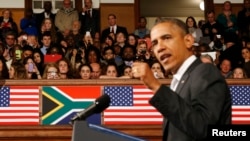JOHANNESBURG —
South Africa has asked the United States to ease sanctions on Zimbabwe’s leaders ahead of scheduled July 31 elections.
The sanctions were imposed on President Robert Mugabe and his inner circle because of alleged rights abuses. South Africa argues the sanctions have been counterproductive, hurting the nation’s economy.
“Instead of assisting the economy of Zimbabwe, in fact they have had a negative effect on the economy of Zimbabwe," said Lindiwe Zulu, special advisor on international relations to South African President Jacob Zuma, the chief negotiator on Zimbabwe for the Southern African Development Community (SADC). "The purpose for the sanctions was supposed to make those individuals not to be able to travel to countries, which they have not done, and not much has made a difference on their not being able to travel."
The SADC argues sanctions deter business by giving Zimbabwe a negative image.
However, citing numerous documented abuses on the part of Mugabe’s ZANU-PF party, Human Rights Watch's Africa Advocacy Director Tiseke Kasambala wants U.S. President Barack Obama to keep the sanctions in place.
“As a matter of principle, I think certainly these sanctions have worked and it’s for that reason that we see a concerted effort by ZANU-PF to continue talking about them," Kasambala said. "Because if they didn’t work, ZANU-PF won’t care. But we’ve seen ZANU-PF go on a drive throughout SADC, talking about how these sanctions must be lifted before they themselves can engage with governments."
Others believe the sanctions should remain in place until Zimbabwe proves itself by holding free, fair and credible elections.
“It puts pressure on ZANU-PF to change their ways," said Johannesburg-based researcher James Stent of Good Governance Africa. "And the sanctions also encourage Zimbabwe to stick to more international norms, such as holding credible elections. If Zimbabwe can transform itself back into a country which sticks to the rule of law, to democratic processes, it’s very likely the sanctions will be lifted, as the divestment campaign against apartheid South Africa worked to move the country towards a democratic society.”
Obama did not directly respond to Zuma’s request, but he did mention Zimbabwe in a speech to students at the University of Cape Town.
“There is an opportunity to move forward, but only if there is an election that is free and fair and peaceful so that Zimbabweans can determine their future without fear of intimidation and retribution," he said. "And after elections, there must be respect for the universal rights upon which democracy depends.”
Mugabe, who at age 89 is Africa's oldest leader, seeks to extend his 33-year rule. His opponents want to delay the July 31 poll to enact political reforms, in hopes of preventing a repeat of the bloodshed that marred the 2008 election.
The sanctions were imposed on President Robert Mugabe and his inner circle because of alleged rights abuses. South Africa argues the sanctions have been counterproductive, hurting the nation’s economy.
“Instead of assisting the economy of Zimbabwe, in fact they have had a negative effect on the economy of Zimbabwe," said Lindiwe Zulu, special advisor on international relations to South African President Jacob Zuma, the chief negotiator on Zimbabwe for the Southern African Development Community (SADC). "The purpose for the sanctions was supposed to make those individuals not to be able to travel to countries, which they have not done, and not much has made a difference on their not being able to travel."
The SADC argues sanctions deter business by giving Zimbabwe a negative image.
However, citing numerous documented abuses on the part of Mugabe’s ZANU-PF party, Human Rights Watch's Africa Advocacy Director Tiseke Kasambala wants U.S. President Barack Obama to keep the sanctions in place.
“As a matter of principle, I think certainly these sanctions have worked and it’s for that reason that we see a concerted effort by ZANU-PF to continue talking about them," Kasambala said. "Because if they didn’t work, ZANU-PF won’t care. But we’ve seen ZANU-PF go on a drive throughout SADC, talking about how these sanctions must be lifted before they themselves can engage with governments."
Others believe the sanctions should remain in place until Zimbabwe proves itself by holding free, fair and credible elections.
“It puts pressure on ZANU-PF to change their ways," said Johannesburg-based researcher James Stent of Good Governance Africa. "And the sanctions also encourage Zimbabwe to stick to more international norms, such as holding credible elections. If Zimbabwe can transform itself back into a country which sticks to the rule of law, to democratic processes, it’s very likely the sanctions will be lifted, as the divestment campaign against apartheid South Africa worked to move the country towards a democratic society.”
Obama did not directly respond to Zuma’s request, but he did mention Zimbabwe in a speech to students at the University of Cape Town.
“There is an opportunity to move forward, but only if there is an election that is free and fair and peaceful so that Zimbabweans can determine their future without fear of intimidation and retribution," he said. "And after elections, there must be respect for the universal rights upon which democracy depends.”
Mugabe, who at age 89 is Africa's oldest leader, seeks to extend his 33-year rule. His opponents want to delay the July 31 poll to enact political reforms, in hopes of preventing a repeat of the bloodshed that marred the 2008 election.








